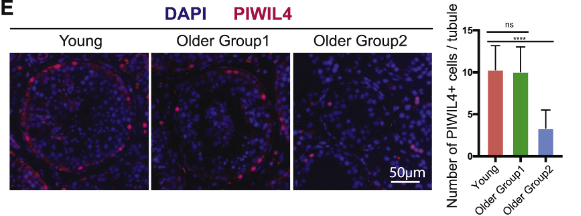Key Points:
- Obese older males have fewer sperm stem cells and impaired sperm development compared to non-obese older males.
- Age-related changes in non-sperm (somatic) teste cells, including increased inflammation, may impair sperm development in older males.
As having children gets pushed to the wayside in lieu of career advancement and the obesity epidemic rages on, fathers tend to be older and fatter. Both of these factors may lead to decreased reproductive health.
In a recent global collaborative study published in Developmental Cell, tissue samples obtained from the testes of older and younger male donors were analyzed at the cellular level. Nie and colleagues found that older men with higher BMIs (greater than 30; normal is below 25) had impaired spermatogenesis — the sperm cell development process. This impairment was not seen in the younger donors, even if they had high BMIs, and it was not seen in the older donors with normal BMIs. Impaired sperm development was attributed to changes in non-sperm supporting cells. These findings help explain how obesity can impair fertility in older males.
“Our work…sheds light on how aging and other concurrent factors (such as BMI) may synergistically impact human testis functionality, which may provide lifestyle guidelines for improving male fertility,” the researchers wrote.
Sperm Production is Impaired by Age and BMI
While sperm cells mature, they can be affected by the health, age, and BMI of their host. Nie and colleagues are among the first to study how aging and other factors affect sperm cells and other cells within the testes at a cellular and genetic level. The researchers searched for signs of spermatogenesis in the testes of eight older donors (men ages 62-76) and four younger donors (men ages 17-22). The older donors with a BMI above 30 showed signs of impaired spermatogenesis despite once being fertile (previously producing offspring). A BMI over 30 indicates obesity, revealing that only the obese older adults showed signs of impaired spermatogenesis.

Spermatogenesis starts with spermatogonial stem cells (SSCs), which can either multiply to maintain an adequate reserve population or develop into sperm cells. Whether SSCs multiply or become functional sperm cells depends on numerous supporting (somatic) cells within the testes (Sertoli cells, Leydig cells, testicular peritubular cells, endothelial cells, and macrophages). The interaction between supporting cells and SSCs can determine the efficiency of sperm development.
Nie and colleagues found that obese older males had a moderate decrease in SSCs, as well as impaired sperm cell development, as measured by a lack of intermediately developed sperm cells. Additionally, in older donors, there was a decrease in the interaction between supporting cells and SSCs, suggesting decreased support for sperm development. Furthermore, there were age-related changes in gene activation by the supporting cells, including increased activation of inflammatory genes. These findings indicate that age-related changes in support cell signaling, including increased inflammation, could be detrimental to sperm cell development in older males.

So Should Men Lose Weight if Trying to Conceive?
Nie and colleagues show that younger males have normal spermatogenesis, regardless of BMI and that older males with a BMI above 30 have impaired spermatogenesis. They suggest that aging may cause modest genetic changes that sensitize teste cells to dysregulation, with more severe dysregulation seen with increased BMI. So, it seems to come down to the interplay between age and BMI. If a man is older and trying to father children, losing weight makes sense, although it is still unclear whether this can reverse impaired sperm production. More research is needed, but increased BMI and its associated increased body fat can be detrimental to many aspects of health, which seems to include fertility.